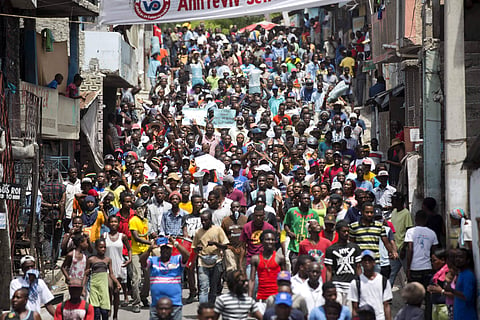

PORT-AU-PRINCE: At least one person was killed amid protests in the capital of impoverished Haiti Friday, following the announcement of a fuel price rise to comply with an International Monetary Fund agreement.
The bodyguard of a politician was killed in an altercation with demonstrators in Port-au-Prince as he attempted to force a passage through a roadblock, with his body then burned in the road.
Burning tires continued to block major routes in the capital, while sporadic gunfire could be heard in several of its districts. Fearful of moving across the city, many decided to spend the night at their offices or businesses.
Earlier Friday, the government said that starting this weekend, the price of gasoline will rise 38 percent, diesel will go up 47 percent and kerosene will cost 51 percent more.
The measure is highly unpopular among the majority of people in a country which is the poorest in the Americas.
Roadblocks further complicated traffic already snarled by drivers trying to fill up before prices rise, but most gas stations had closed in the mid afternoon.
The framework signed in February between the IMF and Haiti implied the ending of subsidies for petroleum products, which are a major source of the budget deficit.
Haiti's government justifies the decrease in subsidies by saying they unfairly benefit the neighboring Dominican Republic, where pump prices are higher.
"Each day it's a subsidy of 5,000-6,000 barrels that we finance for the other side of the border, which is a heavy burden for our economy," said Jude Alix Patrick Salomon, Haiti's Minister of Economy and Finance.
Conscious of how unpopular their announcement was, ministers held a press conference about the price increase during the World Cup soccer quarter-final match of Brazil, the side most Haitians fervently support.
Only at the end of the match, in which Brazil was eliminated at the hands of Belgium, did trouble erupt in the capital.